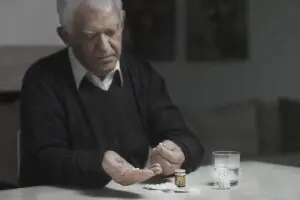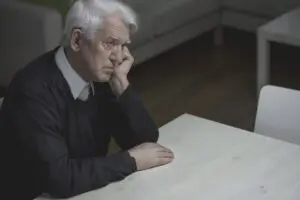Opioid Addiction and the Elderly
 While most people believe the vast majority of addicts are between the age of 18-25, opioid addiction is an increasing problem among seniors who often receive highly addicting medications at points in their lives when they are most vulnerable. With an estimated 2.4% of seniors abusing opiate medication, seniors are at a high risk of developing addiction as well as mental and physical health complications resulting from misuse. These high rates of abuse are especially concerning in senior populations, who often suffer from poor physical health, and who cannot withstand the mental and physical rigors of addiction and prolonged drug abuse.
While most people believe the vast majority of addicts are between the age of 18-25, opioid addiction is an increasing problem among seniors who often receive highly addicting medications at points in their lives when they are most vulnerable. With an estimated 2.4% of seniors abusing opiate medication, seniors are at a high risk of developing addiction as well as mental and physical health complications resulting from misuse. These high rates of abuse are especially concerning in senior populations, who often suffer from poor physical health, and who cannot withstand the mental and physical rigors of addiction and prolonged drug abuse.
If your loved one is abusing an opioid prescription or using heroin or another street opiate, it is crucial to act quickly because opiate misuse in seniors can be deadly. Opiate abuse and misuse contribute to hospital admissions, early death, and psychiatric problems in the elderly, and should be taken seriously and handled quickly to prevent permanent complications and problems. Learning more about your loved one’s opioid addiction will help you to take the right steps so that you can get help to move them into recovery and to a better life.
Why Do Seniors Abuse Opioids?
While the opioid epidemic is sweeping the nation, seniors often stay relatively under the radar because no one considers them as likely candidates for abusing drugs. Despite that, 81% of adults aged 55-75 use at least one prescription medication with more than 50% using 5 or more. Seniors are prone to chronic pain, mental and physical health conditions, and are more likely to be prescribed opioids when recovering from corrective surgery, for chronic pain such as arthritis, and other conditions.
The result is often that an elderly person will receive a prescription for painkillers and be left relatively alone with it for a long period of time. Even with a good management system in place, seniors can still become hooked, because most opioid drugs are highly addicting. For this reason, even users who follow their prescription can become hooked, resulting in problematic behavior later.
 Many also begin to use opiates to cope with life changes and emotional pain. Seniors going through life changes, especially after family has moved out, are especially vulnerable due to loneliness and pain. The elderly often face addiction triggers including:
Many also begin to use opiates to cope with life changes and emotional pain. Seniors going through life changes, especially after family has moved out, are especially vulnerable due to loneliness and pain. The elderly often face addiction triggers including:
- Retirement
- Familial death
- Financial difficulties
- Relocation
- Insomnia or trouble sleeping
- Mental or physical health problems
Even loneliness can trigger long-term drug use, as many seniors must cope with loneliness, depression, and anxiety on their own. This is especially problematic following the death of a long-term partner or pet or when moving from a home into a nursing home.
Opiate Tolerance Contributing to Abuse
Opiate tolerance is one of the largest contributors to addiction in prescription users. Anyone with a longer-term prescription for painkillers will eventually find that the original dose no longer has the same effect. For some users, this can happen fairly quickly, even within a few doses. Here, they may be forced to take more than originally prescribed to get the same effect and numb pain and may be uncomfortable taking the problem to their doctor. This is especially problematic for seniors with long-term opiate prescriptions for chronic pain, which can extend years – often with little to no monitoring in areas where doctors are busy or don’t have the resources to track prescription use.
The increased usage typically results in a greater risk of dependence and addiction. This can result in slowly increasing drug use over time, seniors switching to illegal drugs after their prescription runs out, and practices such as doctor shopping.
Doctor Shopping
Doctor shopping is the process of going to multiple doctors, typically in different states, to attempt to get several prescriptions for the same problem. While this practice is increasingly difficult in the United States thanks to many states using opiate registries to track which patients have prescriptions for which drugs, it’s often still possible especially for those who can easily travel between states because many opiate registries are state-specific or formed in a coalition of states.
If someone you know has prescriptions from several doctors, they are breaking the law and they could face repercussions. In addition, multiple prescriptions for one drug is always a sign of abuse and likely addiction.
Replacing Pain Pills with Heroin
While many seniors continue to abuse prescription pain pills, increasingly tightening regulations on pain pills have cut the availability for many. This can result in users switching to acquiring illicit drugs, either by purchasing opiates such as oxycodone illegally or by switching to heroin.
Heroin or diamorphine is an opioid similar to morphine and fentanyl, and often available much more cheaply than prescription opiates. At about 1/10th the price of painkillers on the street, heroin is an attractive solution for anyone suffering cravings after losing an opioid prescription. However, with no regulation, varying quality and strength, and less control overdoses, it’s also significantly more dangerous to users.
- Having more than one prescription
- Constantly talking about or obsessing about pain pills
- Taking medication differently than prescribed
- Being defensive, lying, or minimizing drug use when asked
- Uncharacteristic mood changes especially in combination with financial difficulties
- Frequent cold and flu symptoms or sickness
If you suspect that your loved one is abusing or addicted to their prescription pain pills, you can get them help. It’s always a good idea to begin by evaluating their drug use, medications, and dosage, as well as discussing the problem with their primary physician. If you and the physician feel it’s necessary, you may want to check your loved one into drug rehab, where they will receive medical support for detoxing safely and therapy to build coping mechanisms. Rehab is typically covered by insurance and will include everything to help your loved one through the difficult and dangerous process of opioid detox so they can recover.
Opioid addiction is a very common problem in the elderly and there are many rehab programs that exist specifically to support their specific mental and physical health needs. With care designed around different health problems and mental and emotional needs, these programs can give your loved one the tools they need to recover fully and go back to enjoying life, without drugs.
If you or a loved one is addicted to any drug, there is help. A rehabilitation facility can give you the support, care, and personal attention to help kick the habit for good, so that you can move past addiction and back to your life. Please contact Beginnings Treatment Centers today and speak with one of our experienced and professional intake advisors, we’re here to help you.
Dangers of Opiate Addiction for the Elderly
While opiate addiction is problematic and dangerous for any demographic, seniors are often hit the hardest by drug abuse. Individuals over 65 have a decreased ability to metabolize opiates, putting them at increased risk of drug overdose. In addition, with weakened immune systems, opiate abuse puts seniors at risk of developing infections and illnesses, because opiates weaken the immune system as well.

Seniors who abuse opiates are at risk of:
- Falls
- Sickness and infection
- Financial repercussions
- Gastrointestinal damage leading to nutritional deficiencies
- Memory loss
- Inability to socialize or connect
The National Council on Alcoholism and Drug Dependence suggests that 6-11% of all senior hospital admissions are related to drug or alcohol abuse. With further statistics showing that 14% of senior emergency room visits relate to drug or alcohol abuse, an opioid addiction greatly increases the chances of accidental injury, illness, and sickness.
Getting Help
If your loved one is abusing opiates, they need help. Opioid addiction can dramatically shorten your loved one’s life by causing increasing mental and physical health problems and decreasing the self-care your loved one is able to give themselves. Drug use takes a toll on even young and healthy users, and many seniors are not healthy enough to withstand long-term drug abuse.
Signs and symptoms of opioid addiction in the elderly include:
- Hiding drug use

